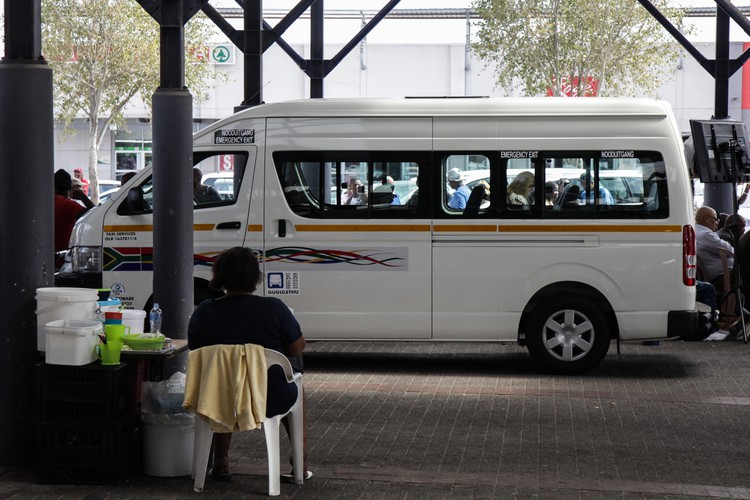Taxi summit proceeds without National Taxi Alliance
Minibus taxi drivers and commuters GroundUp spoke to in Limpopo unaware of the taxi lekgotla
A national summit on taxis is underway in Boksburg, Ekurhuleni, but one of the major taxi associations in the country is not participating. Archive photo: Ashraf Hendricks
From Thursday to Saturday 31 October 2020, the National Department of Transport is hosting the long-awaited National Taxi Lekgotla together with civil society and academics. In attendance are officials from government departments, President Cyril Ramaphosa and Transport Minister Fikile Mbalula (virtual attendance), representatives from the Congress of South African Trade Unions (COSATU), South African National Taxi Council (SANTACO), South African Local Government Association (SALGA), and National Economic Development and Labour Council (NEDLAC).
However, the National Taxi Alliance (NTA), with 188 taxi associations throughout the country affiliated to it, withdrew from participating in the lekgotla. It claimed the government is acting in bad faith and that the Minister of Transport is biased towards SANTACO and that the lekgotla is for that organisations’ benefit.
In its media statement on 23 October, the NTA stated: “Minister Mbalula and his department have made it abundantly clear that the purpose of the National Taxi Lekgotla in to entrench SANTACO as the apex leadership of the taxi industry and to give SANTACO statutory powers to regulate the taxi industry. This is tantamount to inviting us to interfere in the affairs of another organisation we do not belong to”.
The NTA also did not participate in the provincial makgotlas.
Since the 1990s, government has been making efforts to change the industry. The National Taxi Task Team (NTTT) drove the industry’s transformation in 1995. Such a change depended on the ensuing recommendations as embraced in 1996: formalising the minibus taxi industry; regulating and controlling the industry; capacity building and training; and establishing conditions so that the industry is able to maintain and sustain itself economically.
Now 25 years after those recommendations, government is hosting the National Taxi Lekgotla to discuss the following key issues: unity and leadership of the taxi industry; an empowerment model; regulation, professionalization and customer care.
The question remains if there can be unity in the industry if the lekgotla is centred only on SANTACO. It has a democratically-elected council and claims to represent the whole industry, but shortly after it was formed, NTA set up office as a rival.
There have been subsequent conflicts between the two bodies over representation, which continue to cause problems for the Taxi Recapitalisation Programme (TRP), introduced in 1999. The TRP is central to the formalisation and restructuring of the taxi industry. However, while some of the operators with old taxi vehicles have benefited from the TRP through the scrapping process, most have not. Therefore, the scrapping process has not worked for most taxi operators and taxi drivers.
The presence of two mother-bodies both claiming to represent and speak on behalf of the taxi industry considerably complicates attempts by government to consult with the industry and enter into binding agreements.
Meanwhile minibus taxi drivers and commuters who spoke to GroundUp were mostly unaware of the taxi lekgotla.
“If the meeting [lekgotla] aims to formalise the industry and make us speak with one voice, I believe that will stop taxi violence,” said Denis Masvanganya, a driver for five years. His route is from Elim to Johannesburg.
“I use the N1 and pass through Botlokwa, a small town north of Polokwane. No matter there are few empty spaces in my vehicle, taxi associations in Botlokwa will not allow me to load commuters. This is bad for me as well as those commuters,” he said.
Jabulani Mashaba, whose route is from Louis Trichardt to Giyani, said, “My working day can start as early as 5am and ends at 9pm, but the salary does not match the hours … I am paid according to the trips.”
He can do at most four trips a day.
“Maybe if the taxi industry is regulated and able to speak with one voice working conditions may improve,” he said.
Another driver, who wanted to be anonymous, said, “No matter how the taxi industry gets formalised if the Department of Transport does not sort out the issue of operating routes, there will always be conflict.”
A 62-year-old woman driver said, “I sometimes fight with commuters who may not want to pay the full taxi fare. I believe they do that because I am a female and if there are regulations governing this then we won’t have problems.”
She said formalisation of the taxi industry may attract more women.
Support independent journalism
Donate using Payfast

Don't miss out on the latest news
We respect your privacy, and promise we won't spam you.
© 2020 GroundUp. This article is licensed under a Creative Commons Attribution-NoDerivatives 4.0 International License.
You may republish this article, so long as you credit the authors and GroundUp, and do not change the text. Please include a link back to the original article.

